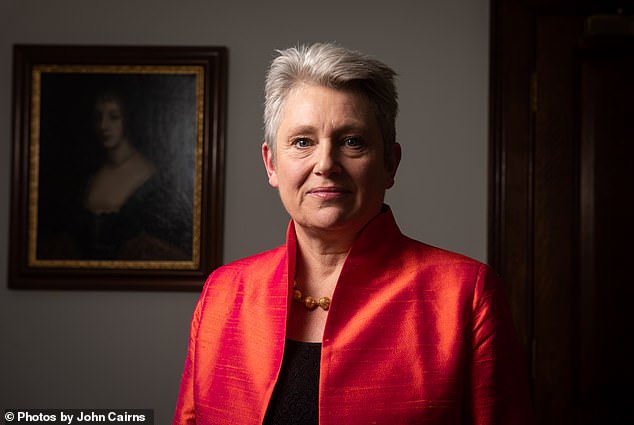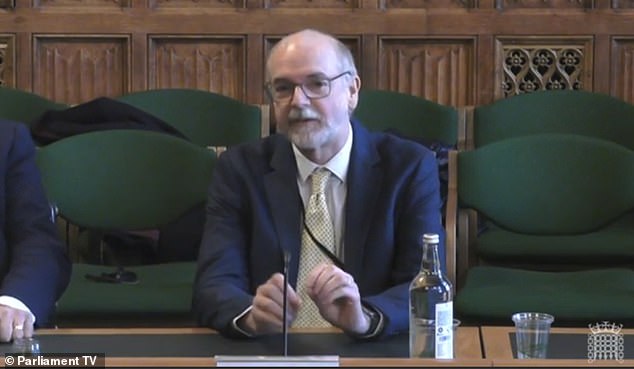Ex-Covid vaccine taskforce boss Clive Dix fights back tears as he tells MPs ‘incompetent decisions’ have left Britain ill-prepared for another inevitable pandemic
The former head of the Covid vaccine taskforce fought back tears as he accused ministers of making “incompetent decisions” that left Britain ill-prepared for a new pandemic.
Dr. Clive Dix said the government destroyed “almost everything that was going on” behind the scenes, despite praising the plan.
pushing back tears, Dr. Dix, who replaced Kate Bingham in December 2020, said the current complacency was “really scary.”
The taskforce was considered one of the biggest successes in the UK’s response to the pandemic.
In a high-stakes gamble, it bought millions of vaccines from pharmaceutical titans that weren’t yet sure they worked. Such deals ensured Britain had access to the jabs as soon as they became available in late 2020.
Dr. Clive Dix said the government destroyed ‘almost everything that was going on’ behind the scenes, despite praising the plan
Dr. Dix, the chief executive of drug research company C4X Discovery, also told MPs today that manufacturers had defected from Britain because they were being treated so poorly in the wake of the Covid jab rollout.
He appeared before the Science, Innovation and Technology Committee as part of its inquiry into emerging diseases and the lessons learned from Covid.
He said: ‘The team of people, the steering group, was a group of very experienced academics, industry people and people with good strategic vision and the ability to make things happen.
“What I’ve seen since April 2021 is a complete demise of all the activities that made that thing work, literally gone.
“It’s very sad, I actually get very passionate about it because what we’ve seen is a whole list of incompetent decisions being made and given the amount of effort we’ve put in to see that just go away.”
The government believes that “mRNA vaccines are a silver bullet,” he added. ‘There’s a complacency there that I’m really afraid of now. It really scares me.’
After committee chairman and Tory MP Greg Clark claimed that ‘the government had rightly trumpeted the success of the vaccines’, Dr Dix intervened: ‘And then almost destroyed everything that was going on’.
The 250-strong task force was established in April 2020 but was closed in October 2022 after the threat of the pandemic subsided.
Bosses at Britain’s Health Security Agency stepped in to take control of vaccine supplies.
Dame Kate – who chaired the taskforce between May and December 2020 – was given a damehood in recognition of the success of her program to acquire Covid vaccines, which allowed Britain to become the first western country to launch a jab program in December 2020 began.
But Matt Hancock, then health secretary, clashed with her over the rollout, including Dame Kate’s refusal to back a plan to buy tens of millions of vaccines from India.
Dr. Dix told MPs today: ‘There was a series of very strong recommendations that myself and Kate Bingham wrote together. They haven’t seen the light of day.’
In leaked WhatsApp messages published by The Telegraph last March, the The former health secretary branded the government’s vaccination czar Dame Kate Bingham as ‘completely unreliable’ and ‘crazy’ after she said only the vulnerable should be vaccinated against Covid.
Dr. Dix became deputy chair of the vaccine taskforce in June 2020 and took on the role of interim chair at the end of 2020, when Dame Kate stepped down.
Dr. Dix told MPs today: ‘There were already activities going on that were then simply stopped and all I see now is ‘we have a nice deal with Moderna for ten years’.

Dame Kate Bingham – who chaired the taskforce between May and December 2020 – was given a damehood in recognition of the success of her program to acquire Covid vaccines, which allowed Britain to become the first western country to have one in December 2020 injection program started. Dix told MPs today: ‘There was a series of very strong recommendations that myself and Kate Bingham wrote together. They didn’t see the light of day
‘That’s just not good enough. That’s really scary.’
In further criticism, he also argued that the government’s post-pandemic decision to focus on the mRNA-type Covid vaccines, such as those made by Pfizer and Moderna, meant that the UK’s current supplies were ‘not good enough ‘ are.
He said: ‘It’s just not good enough. The mRNA vaccines will only work if we know what the virus is and we know the antigen.
‘Without that they have to start all over again. They probably need to make every antigen in the virus and see if they do anything in humans.
‘We have less resilience now because many manufacturers have walked away from Britain because they were treated so poorly at the tail end of the vaccine task force.’
When pressed by MPs as to why the government responded in this way, Dr Dix argued that there was ‘no strategic leadership’.
He added: ‘I’m not saying I’m the great strategic leader, but the task force had it in it.
“The group knew what they were doing, where they were going and created a plan for resilience. That’s all stopped.’
Dame Kate herself has previously criticized the ‘stupid’ decisions that have jeopardized the country’s ability to cope with a future virus outbreak.
At the same session, Sir Andrew Pollard, director of the Oxford Vaccine Group, who was also called to testify, slammed the government for failing to learn from its Covid mistakes.
He told MPs: ‘In many ways we are not in a very different position. The question is really: anticipate what the next pandemic will look like.
‘The danger here, of course, is that we look back on the pandemic we just had and think only about preparing for a new one that is exactly the same.
“It’s important to remember that with the disease we were dealing with, we already knew a lot about the coronavirus. We knew how to make vaccines for them.
‘One of the problems we have is that for most of the other microbes that are out there that could threaten us, we haven’t done that work.
‘If the research and development were to take ten to twenty years, we are far from reaching that starting point.’
Work to combat the threat from different virus families “requires years of investment,” he argued.
“If you think about defense against something unknown – which is clearly an important way to think about pandemics – and then you think about the other types of defenses we have, like military defense, the world feels very unsafe today,” he said .

At the same session, Sir Andrew Pollard, director of the Oxford Vaccine Group, who was also called to testify, slammed the government for failing to learn from its Covid mistakes.
‘The Government is investing, I think, £45 billion a year in defence. We realize that we have to do things.’
He added: “But for pandemics, we spend a small portion of that on preparedness.
“To me, we are really unsafe at this point from future pandemic threats because we just don’t have that knowledge base that you need to even start the weapon like we did in 2020. Even then it took eleven months to have a vaccine.’
It comes as The Chief Physician of England, Sir Professor Chris Whitty also argued in November that the government would also have paid much more attention to the risks of Covid if it were a terrorist or geopolitical threat, rather than a natural threat.
In evidence for the Covid inquiry, he said there was an “opportunity where we could probably have moved up a gear within the government” in early February 2020 if the system had been “electrified” by the information it already had about Covid.
Agreeing with research advisor Hugo Keith that there was a ‘systemic failure’, he argued that if MI5 had warned that 100,000 people could die in a terrorist attack; the chances that the system would have continued as it did would have been “quite small.”
“The system, in my opinion, is surprisingly poor at responding to these types of threats that don’t exist within the national security system,” he said.
“Hard geopolitical threats are treated differently than natural threats.”
